Operational Plan
Highlights 2024
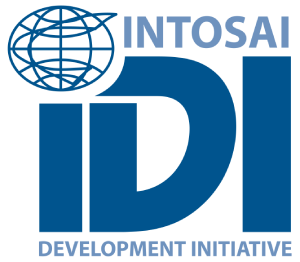
From the Director General’s Desk
I am delighted to introduce the Operational Plan for 2024, the inaugural year of the new Strategic Plan for the INTOSAI Development Initiative (IDI). As we embark on this journey to operationalise our vision for 2024-2029, I extend my heartfelt gratitude to our dedicated staff, partners, and the broader Supreme Audit Institution (SAI) community for their unwavering support throughout the implementation of the past strategic plan as well as the process for developing the new one.
Now that we are stepping into this new era, it is essential to reflect on the journey that led us here. Our new Strategic Plan builds upon the successes and lessons of the past while aligning with the evolving needs of SAIs in developing countries. It demonstrates our commitment to enhancing transparency, accountability, and governance across the globe.
Continuity is a cornerstone of our approach, and I am pleased to announce that the four work streams from the previous strategic plan—Independent SAIs, Well Governed SAIs, Professional SAIs, and Relevant SAIs—will remain at the forefront of our efforts. These streams have proven instrumental in catalysing positive change within SAIs and will continue to guide our actions.In addition to these, we are elevating the focus on two critical dimensions: Bilateral Support and Global Foundations, both of which have demonstrated their value in providing tailored assistance and fostering partnerships globally. They will now also be known as work streams, reinforcing our dedication to comprehensive capacity development. Our focus on gender and inclusion continues into the new period.
Our new Strategic Plan seeks to provide SAIs with more stable and predictable support, enhancing our impact. To achieve this, we have identified three strategic priorities that will guide our activities: ‘Sustainability’, ‘Digitalisation’, and ‘Public Trust in SAIs’.
The Operational Plan for 2024, which includes this Operational Plan Highlights and detailed Work Stream Operational Plans, is structured around these strategic priorities. It outlines our roadmap for the year, the activities planned, and the expected outcomes in terms of the IDI Results System that will support the new Strategic Plan.
The committed involvement and drive of all our stakeholders and staff is the bedrock upon which our success is built. As we move forward, I eagerly anticipate your continued collaboration and support. Together, we will stay true to our values of being professional, innovative, collaborative and acting with heart, and empower independent, credible, and sustainable SAIs for better societies and improved lives.


IDI Key Performance Indicators
IDI contributes to improving the performance of SAIs. These are the expected outcomes of IDI’s work. The IDI results system measures and monitors changes in the performance of SAIs following IDI support. Performance improvement is a long-term process, whereby results are noticeable at the end of, or after, the provision of support. IDI uses the following key performance indicators to measure its contribution to SAI performance change. The targets relate to when IDI support is expected to contribute to a positive change, and when this will be measured – so not all indicators have targets for 2024. Nevertheless, these are included within the 2024 Operational Plan to provide an overview of some of the intended results towards which IDI is working.
The second table focuses on expected IDI outputs for 2024, which are milestones on the road towards the expected outcomes, and which will be reported against in IDI’s 2024 Performance and Accountability Report.

Outcomes (Improvements in SAI Outputs and SAI Capacity)
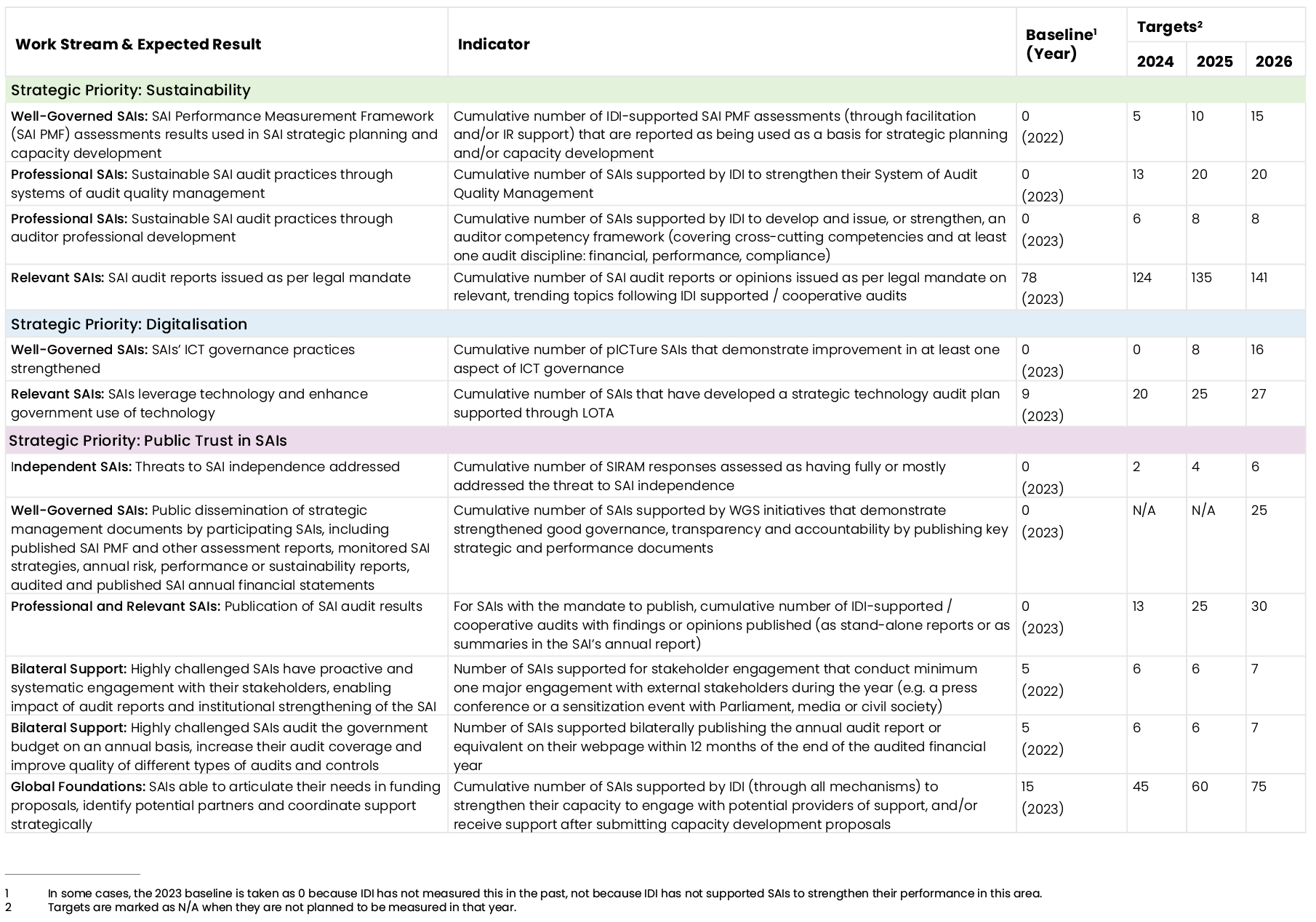
IDI Outputs
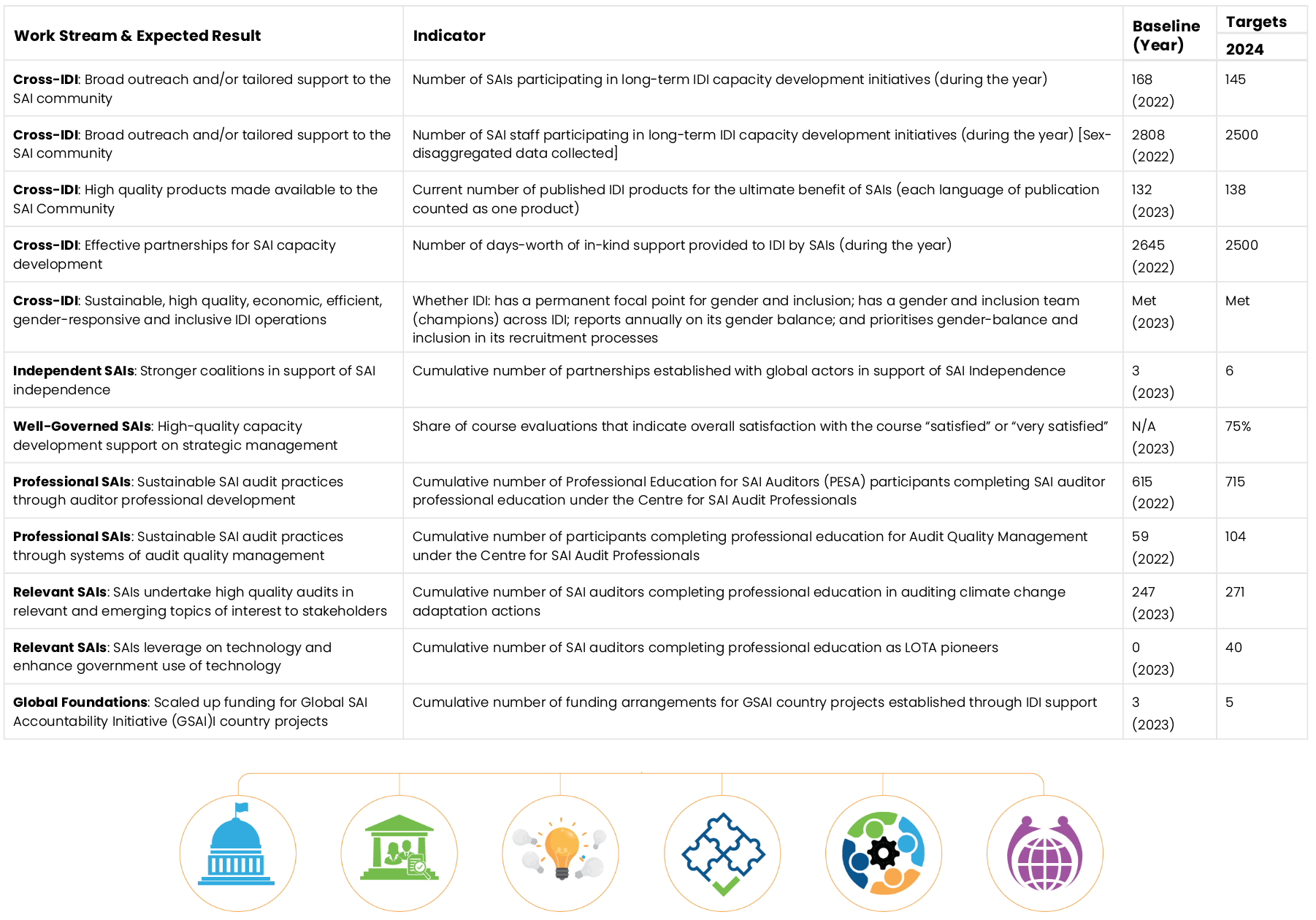
Integrated approach to IDI Strategic Framework
We have outlined our strategic priorities in the Strategic Plan 2024-2029, focusing on Sustainability, Digitalisation, and Public Trust in SAIs. During 2024, our six work streams will actively contribute to these priorities, for better societies and improved lives.
Sustainability:
The Independent SAIs work stream will contribute to sustainability, as independence is a critical enabler of both sustainable SAI governance practices and sustainable SAI audit practices. Regarding sustainable SAI Audit practices, we will provide support where needed to ensure SAIs have the appropriate mandate. On governance practices, we will provide support on demand to ensure SAIs’ legal frameworks are robust enough to allow SAIs to take autonomous decisions in governance areas, such as Human Resources (HR), ICT, ethics and integrity.
Our Well Governed SAIs work stream will play a vital role in promoting sustainability by enhancing governance practices within SAIs. We will continue our support to SAIs in assessing themselves against the SAI PMF and in assessing their performance, strengths and weaknesses in areas such as HR governance, ICT governance and risk management. The assessment tools are closely aligned so as to minimise the application time and efforts needed by SAIs. Sustainable governance also requires SAIs to develop and implement realistic, high-quality strategies on how to address challenges. We work with SAIs to institutionalise strong strategic and operational management processes, with careful consideration of human and financial resources. Across the work stream, we streamline change management considerations to support gradual and sustainable change in line with SAI absorption capacity. This also entails building internal capacity of SAI middle- and upper management to lead such change through dedicated interactions such as the SAI Governance Academy and a masterclass on inclusive leadership.

We have restructured the Professional SAIs work stream to support SAIs in enhancing sustainable SAI audit practices which are responsive, add value, deliver quality and impact on a sustainable basis, for contributing to better societies and improved lives. Sustainable audit practices require a regular supply of a critical mass of competent SAI auditors. The Centre for SAI Audit Professionals will be set up to provide exactly such support on a long-term predictable basis. We will also offer holistic, tailored, in-depth support for sustainable audit practices (Financial Audit (FA), Performance Audit (PA), Compliance Audit (CA)). Such support will focus on systems rather than one-off products. The seven ‘envelopes’ offered under this support range from raising SAI profiles to setting up systems for strategic and annual audit planning, audit methodology, developing competent audit professionals, quality management, audit follow up, and pilot audits to test the new systems. Effective SAI audit leaders are the drivers of sustainable audit practices. We will work with both development of leaders, especially young leaders, and engagement with SAI leadership at various levels. Finally, sustainable audit practice needs an appropriate institutional framework and stakeholder ecosystem for thriving and delivering impact. We will support SAIs in demonstrating value and engage with stakeholders for strengthening the institutional framework for SAI audits.
We have also restructured the Relevant SAIs work stream. It now shares the same objective as the professional SAIs work stream - to support SAIs in enhancing sustainable SAI audit practices, which are responsive, add value, deliver quality and impact on a sustainable basis, for contributing to better societies and improved lives. Besides being high quality, SAI audit practices need to be relevant to the SAI context and stakeholder expectations to be sustainable. We will help SAIs in auditing four key trends – technology, climate action, equal futures and SDGs. We have built sustainability mechanisms like development of competent auditors and effective SAI audit leaders through LOTA Pioneers, Equal Futures Audit (EFA) Changemakers, Climate Change Adaptation Actions Audit (CCAAA) and Sustainable Development Goals (SDG) Auditors initiatives. We plan to develop and maintain audit resources and education in these areas on a long-term, predictable basis. We also plan to facilitate cooperative audits regularly, to cover different topics under the identified trends. Most importantly, by supporting SAIs strategic audit planning processes, we will help SAIs identify key trends and craft appropriate audit responses to them for the long term. We will also support SAIs in communicating the significance of their roles in these areas, thereby contributing to the impact of audits. Based on demand and resources, we will also support SAIs in auditing newly identified trends.
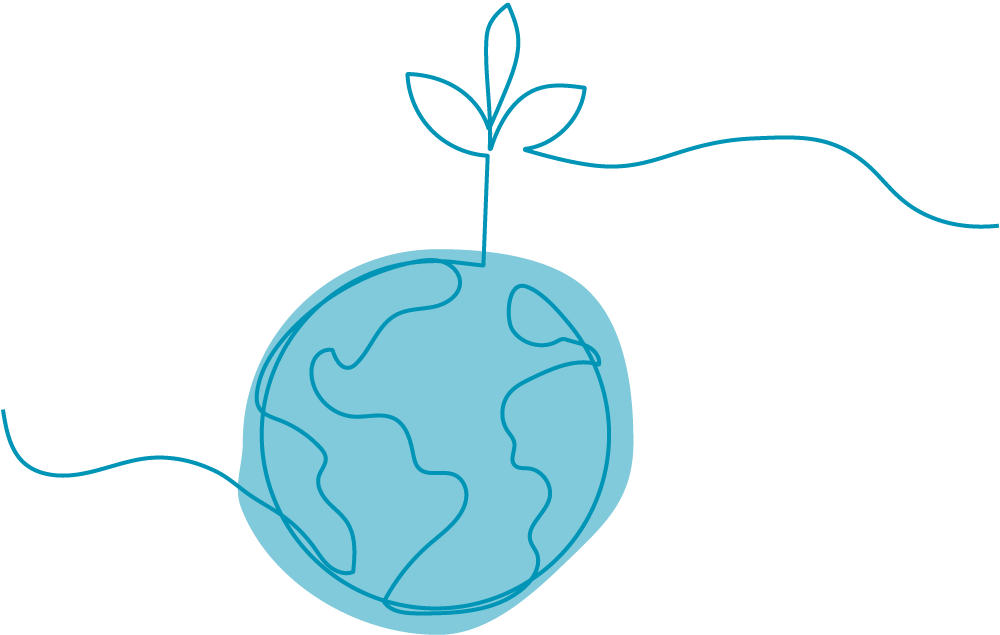
The Bilateral Support work stream will foster sustainable SAI governance practices by prioritising support to strategic management, including sound operational planning, monitoring and reporting, in most bilateral country projects. We will support all SAIs in the portfolio to manage external support in a transparent way, and thus secure sufficient resources. We will support several SAIs to enhance human resource management, internal ethics and financial management. Sustainable SAI audit practices will be provided through customised support to the annual audit planning, quality management and reporting process. This is the area where we allocate most resources in the larger country projects. For most SAIs in challenging contexts, there is a tough prioritisation of audits given the limited resources and the fact that sustainable audit practices require extensive support to overall audit management, efficiency of processes and auditor staff competencies. Sustainability aspects are covered in many SAI audits that we support. For example, in some countries there are audits assessing gender and inclusion, and support to such audits is a priority for country projects under the Accelerated Peer support Partnership (PAP-APP) programme.
To enable SAIs to contribute to sustainable development, the Global Foundations work stream will continue its work in advocating for SAIs and increase the awareness about their importance across different stakeholders. We will organise training for SAIs on seeking funding for climate change. We will facilitate a pilot on peer-to-peer support on environmental auditing in partnership with INTOSAI Working Group on Environmental Audit (WGEA). Sustainable audit practices can only be established through needs-based and fit-for-purpose capacity development. Our Brokering Upscaled SAI Support (BUSS) Initiative will continue to facilitate SAI-donor engagement and mutual understanding to enable this. In 2024 this includes activities in the Arab Organisation of Supreme Audit Institutions (ARABOSAI) region.
Digitalisation:
The Independent SAIs work stream will support SAIs in assessing their mandate and legal frameworks and adapting them to the digital age. This will entail focusing on specific Independence principles, such as Principle 4 of the Mexico Declaration on access to information, to ensure the SAIs’ legal frameworks also enable information to be accessed in a digital format while respecting the individual rights encapsulated in processes like General Data Protection Regulation (GDPR).
The Well Governed SAIs work stream entails a strong focus on supporting SAIs in digitalisation. Here, we focus on ICT governance as a critical enabler for SAIs to exploit the opportunities of new technologies to improve their audit work. We work with SAIs to achieve a better understanding of their ICT needs. We will also zoom in on topics such as knowledge management, Information Technology (IT) security, innovation, and design thinking. SAIs will also benefit from a module on leading digital change. We have developed and work with various digital tools that SAIs can adopt to maximise efficiency and effectiveness in their strategic and operational processes. These include eSAI PMF, STORY (a platform that offers the key tools to bring strategy and strategic management into the digital age) and a risk management tool (under development). Through these, SAIs have the opportunity to build their digital capacity from the bottom up.
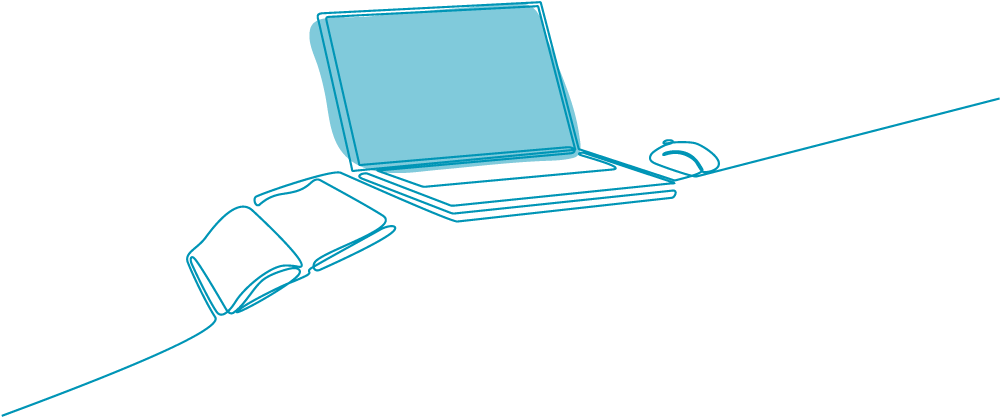
The Professional SAIs and Relevant SAIs (P&R) work streams will work together to support SAIs in using technology in audits and contributing value by auditing the use of technology and digital transformation. Within the Professional SAIs work stream we have included IT skills as a cross-cutting competency for financial, performance and compliance auditors in IDI’s PESA certification. The SAI auditors’ tool kit also includes some basics of data analytics for all SAI auditors. The strategic technology audit plans developed, and the technology audits conducted by SAIs within LOTA Pioneers and professional learning for technology auditors will encompass performance, financial or compliance audits. As such the audit quality and impact of these audits will be supported by our work in the professional SAIs work stream.
One of the key trends that the Relevant SAIs work stream works with is technological advancement and digitalisation. The work stream will support audits of technology and use of technology in audits. This is currently being done through the LOTA initiative, with sub-initiatives including development of a LOTA scan tool, LOTA Pioneers and LOTA talks. To provide long-term, predictable and sustainable support we plan to introduce professional learning for SAI auditors in technology audits and use of data analytics in audits, to be offered on a regular basis. Besides online education, auditors will conduct actual technology audits or use technology in SAI audits. We plan to foster LOTA Connect as a network of alumni and mentors working in this space. We will also help SAIs to draw connections between this trend of technology and other trends like equality, Sustainable Development Goals (SDGs), and climate action.
For the Bilateral Support work stream, digitalisation of the audit process is important for SAIs in challenging contexts to ensure resources are well utilised and data is protected. Our support for this will continue for the SAIs of Eritrea, the Gambia, Madagascar, Somalia and South Sudan, and be initiated in Belize and Kyrgyzstan in 2024. The support will take a stepwise and holistic approach, where SAIs are supported to ensure overall IT governance and management are in place, hardware is procured, and basic software is utilised before embarking on more advanced tools.
Digitalisation is a priority for the Global Foundations work stream. In equal measure, we will work with SAIs on digitalisation and make efforts to improve service delivery by IDI through digital means. In 2024, our work on brokering support will support SAIs in their technological and digitalisation initiatives. This will include our brokerage and partnership-development work through BUSS, where funding for digital support is often a focus, as well as administering technology-based grants like the Saudi Fund for improved SAI performance (SAUDI FISP). For IDI’s internal operations, we plan to further explore digitalisation to streamline operations through use of automation and artificial intelligence. This would cover drawing relevant insights from the Global SAI Stocktaking Report being completed in late 2023, as well as development of ‘Blue’- IDI’s digital information system.
Public Trust in SAIs:
The Independent SAIs work stream will contribute to raising Public Trust in SAIs by continuously supporting the institutional strengthening of SAIs through proactive and reactive advocacy support, including through mechanisms such as the SIRAM. Supporting this strategic priority will also entail working on other dimensions of SAIs’ institutional set-up such as their ability to coordinate with other organisations, to manage integrity risks and to demonstrate their own accountability.
Establishing knowledge-driven partnerships will remain at the core of our strategies to support strong stakeholder engagement for SAI Independence. In 2024, we will focus our joint research project with the Organisation of Economic Cooperation and Development (OECD) and the integration of the OECD framework on Drivers of Trust in Public3 to inform the way Public Trust in SAIs can be enhanced.
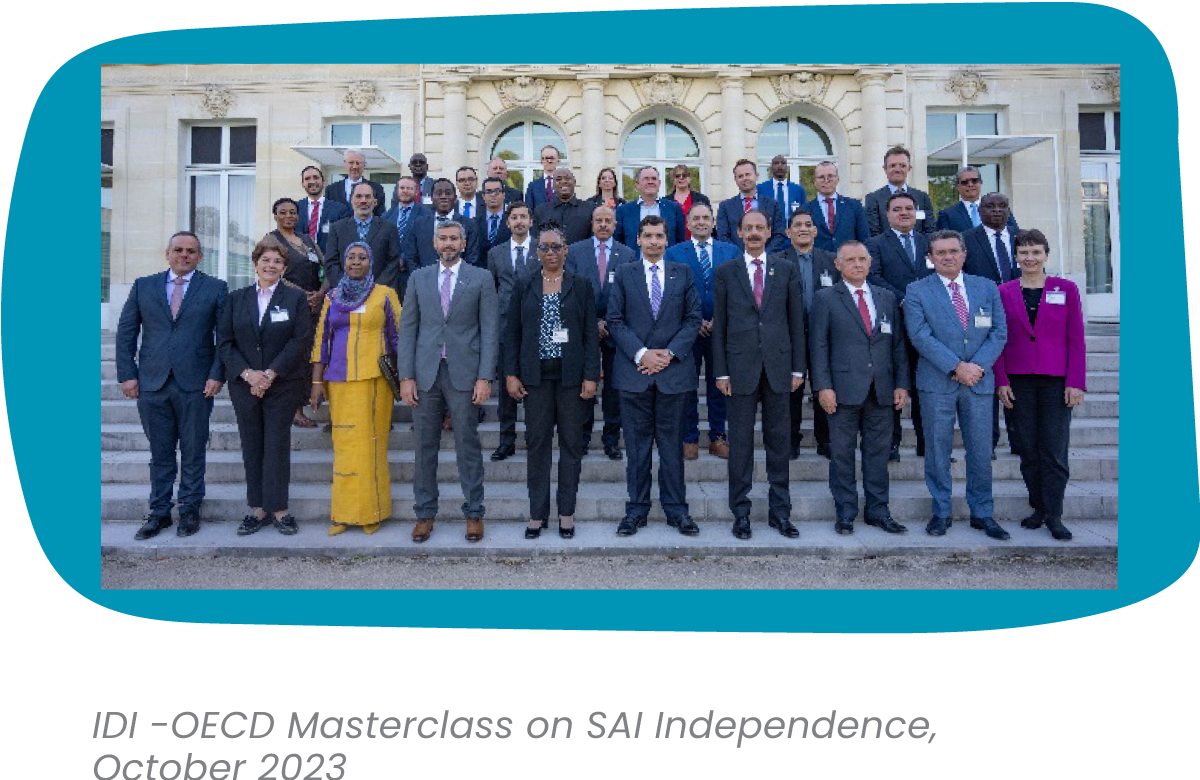
Well Governed SAIs work stream will contribute to stronger public trust in SAIs by supporting them in better demonstrating their value. In the spirit of INTOSAI P-12, we support SAIs to lead by example through enhancing the transparency, accountability and integrity in their own governance and operations. We will continue to encourage SAIs to share the results of the performance assessments and support them in carrying out an analysis of their stakeholders’ views and expectations. We work with SAIs to prepare externally oriented strategic plans that anchor the role of the SAI as an actor in the PFM and accountability ecosystem. We emphasise the strong signal that published SAI performance reports and audited financial statements send to the public in terms of transparency and accountability. Given that SAI leadership is indispensable to that end, we will have dedicated interactions with them to support their foresight and ability to lead change. More in-depth support to selected SAIs will focus on the interlinkage between governance and independence issues, with the aim of raising the institutional and public profile of those SAIs, including through stronger engagement with external stakeholders.
Professional & Relevant SAIs work streams work with the principle that Public Trust in SAIs is enhanced when SAIs demonstrate value. Under the Professional SAIs work stream, all our efforts will be focused on helping SAIs deliver high quality and high impact audits that make a difference. We will support high quality, high impact audits by developing competent SAI auditors through the Centre for SAI Audit Professionals. As a part of supporting sustainable audit practices, we will help SAIs facilitate audit impact and demonstrate value by planning for audit impact, building robust follow-up systems and forming strong stakeholder coalitions. We will support the strengthening of the institutional framework for SAI audits by raising the profile of audits through advocacy, awareness-raising and stakeholder engagement.
In the Relevant SAIs work stream, we will support SAIs in demonstrating the value of their audits in new and trending areas by supporting SAIs in facilitating audit impact, building impact considerations throughout the audit process, supporting robust follow-up of audits and building strong stakeholder coalitions. We will also convene joint forums of SAIs and key stakeholders to create awareness about the role of SAIs and bring more visibility to the work of the SAIs in each of the trending areas. Lastly, we will help SAIs fulfil their audit mandates by supporting SAIs in the application of new audit approaches to audit emerging trends - for example, the use of a whole-of-government approach in auditing SDGs.
Public trust in SAIs is a high priority in the Bilateral Support work stream projects. These SAIs are not always well known, and there is a need to strengthen their standing and credibility among key stakeholders to enable institutional development and sufficient resourcing. In 2024 we will prioritise stakeholder engagement in the projects in South Sudan, Somalia, DRC, Madagascar, Belize and Guinea. For most SAIs, this includes sensitisation of the Parliament, which includes enabling them to discuss and follow up on audit reports. In Somalia, meetings with the Parliament as well as other stakeholders will be important to support wide understanding of the new audit legislation.
In 2024 the Global Foundations work stream will continue to help build donor trust in SAIs through the INTOSAI-Donor Cooperation (IDC) platform, stakeholder partnerships and the BUSS workshops. To support improved understanding of SAI context and performance and demonstrate SAI value, we will disseminate the results of the Global SAI Stocktaking Report 2023. IDI-wide communications activities will be extended beyond the SAI community to raise awareness of SAIs and their work, including op-eds and press releases, advocacy on behalf of the IDC Goodwill Ambassador for SAI Independence, and a series of webinars on stakeholder engagement hosted jointly by the Global Foundations work stream and the INTOSAI Journal. We will continue the roll-out of joint activities with the Inter-Parliamentary Union (IPU) to reinforce SAI-Parliament relations, including global webinars and support to Caribbean SAIs and Parliaments, and our partnership with IMF, where the objective is to share expert knowledge on SAIs and influence IMF to elevate the role of SAIs in policies and practices.
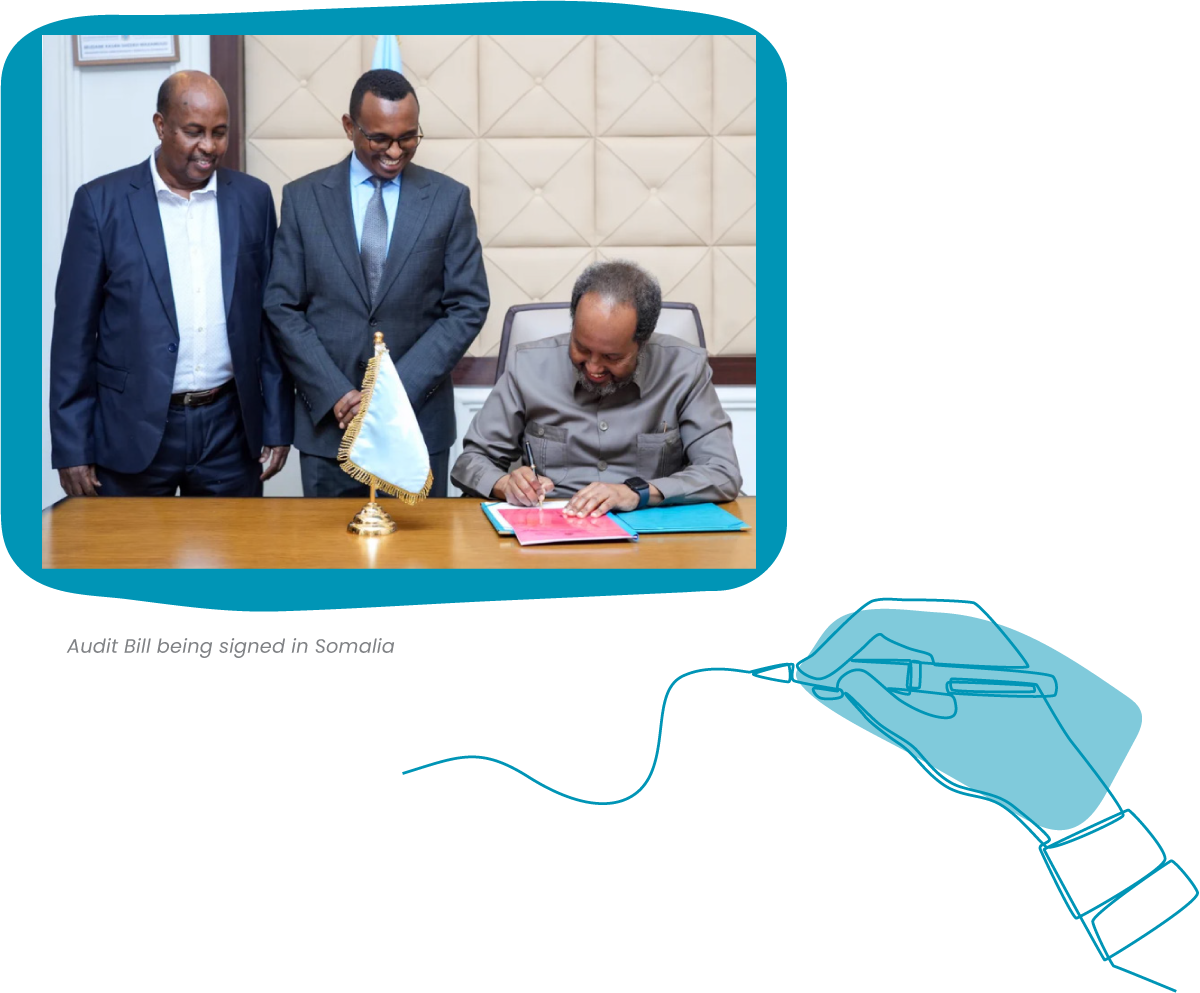
3 An updated oecd framework on drivers of trust in public institutions to meet current and future challenges © OECD 2021
Enablers of SAI Performance Improvement
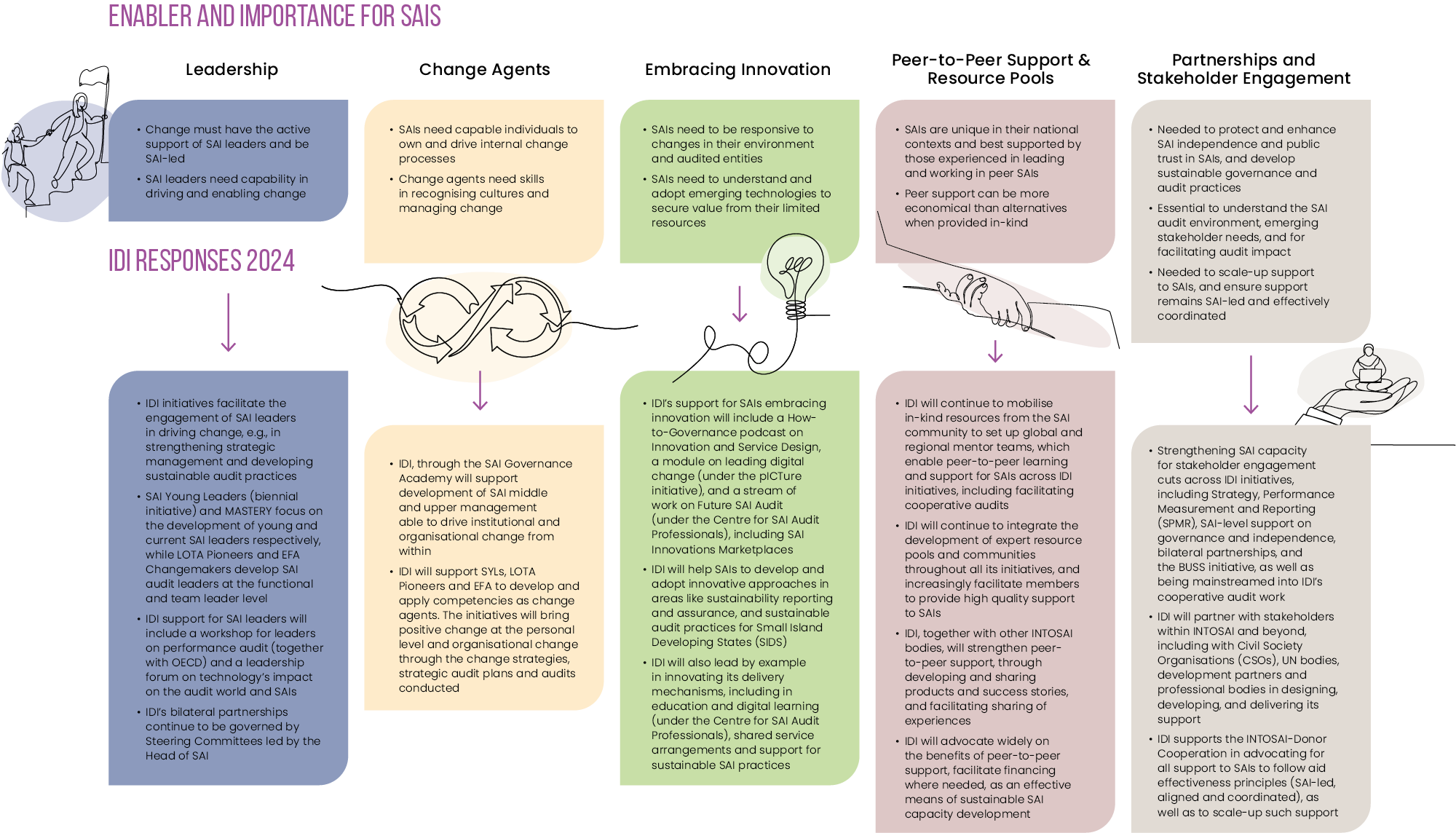
What’s new in IDI
Under the Independent SAIs work stream, several new activities will take place in 2024:
The first initiative is our joint research project with OECD which was launched during the Masterclass on SAI Independence in 2023. The research project aims to complement the Mexico Declaration and will result in the IDI-OECD guidelines on SAI Independence addressed to Ministries of Finance and Parliaments.
In 2024, the scoping of the project will be finalised, and the initial research will begin.
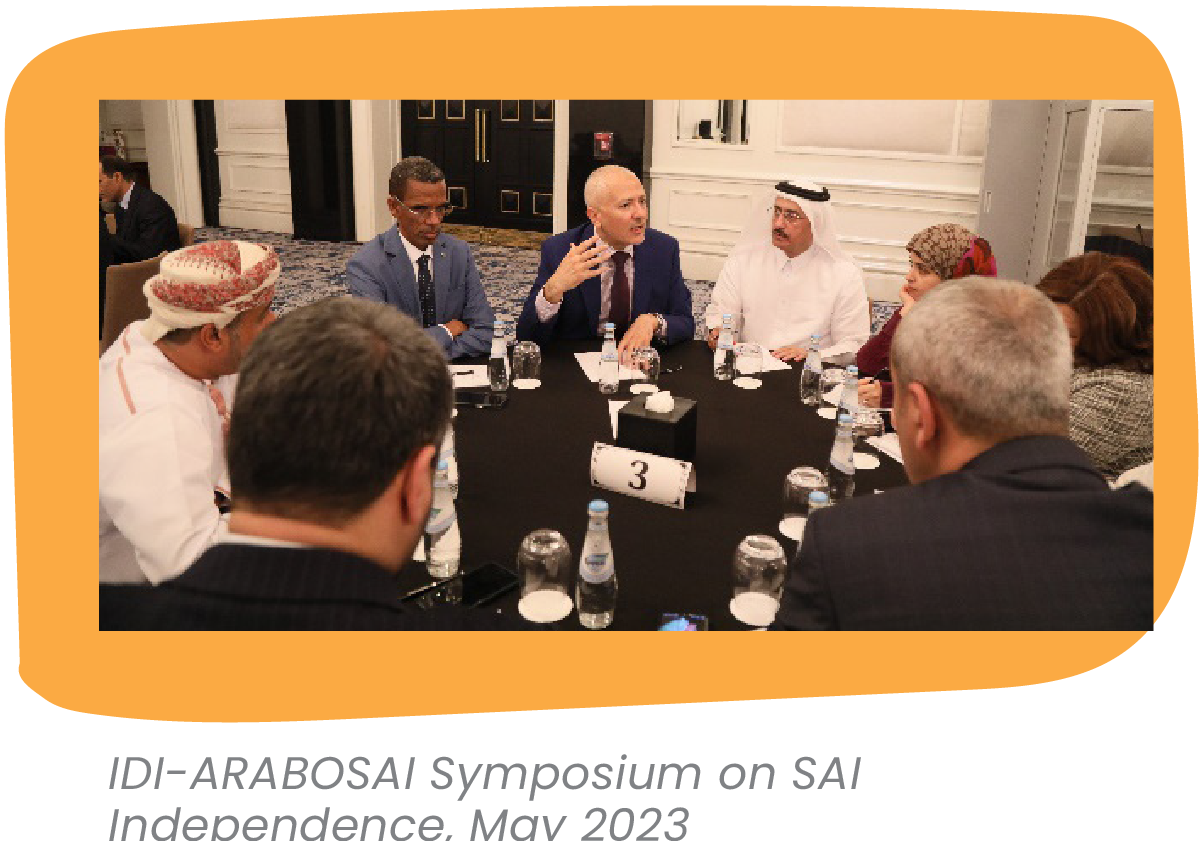
The second will build on the results of Mastery with OECD and the 1st IDI – Arab Organisation of Supreme Audit Institutions (ARABOSAI) Symposium, and will aim to facilitate regional interaction between SAI leaderships and influential regional/continental stakeholders.
These interactions will be organised on the margins of regional events and will be open to all SAIs within the specific target group. They will also be geared towards tangible outcomes, such as a Declaration and/or joint action plans.
In 2024, we will host a follow-up event with ARABOSAI, as well as events with Organisation of Latin American and Caribbean Supreme Audit Institutions (OLACEFS), African Organisation of Supreme Audit Institutions (AFROSAI) and the EU contact Committee of SAIs.
The third will target SAIs’ legal functions with the ambition to strengthen their role as the first line of defence in safeguarding and protecting SAI Independence in case of threats, consolidating their role in spearheading legislative changes. It will include three pillars, one focusing on the legal unit itself, the second will target the practitioners, while the third will focus on the development of tools, guidance, and generation of knowledge.
The initiative, which forms part of IDI’s proactive approach to SAI Independence will be developed in partnership with African Organisation of English-Speaking SAIs (AFROSAI-E), the Italian Court of Auditors, as well as experts within and outside of the SAI community.
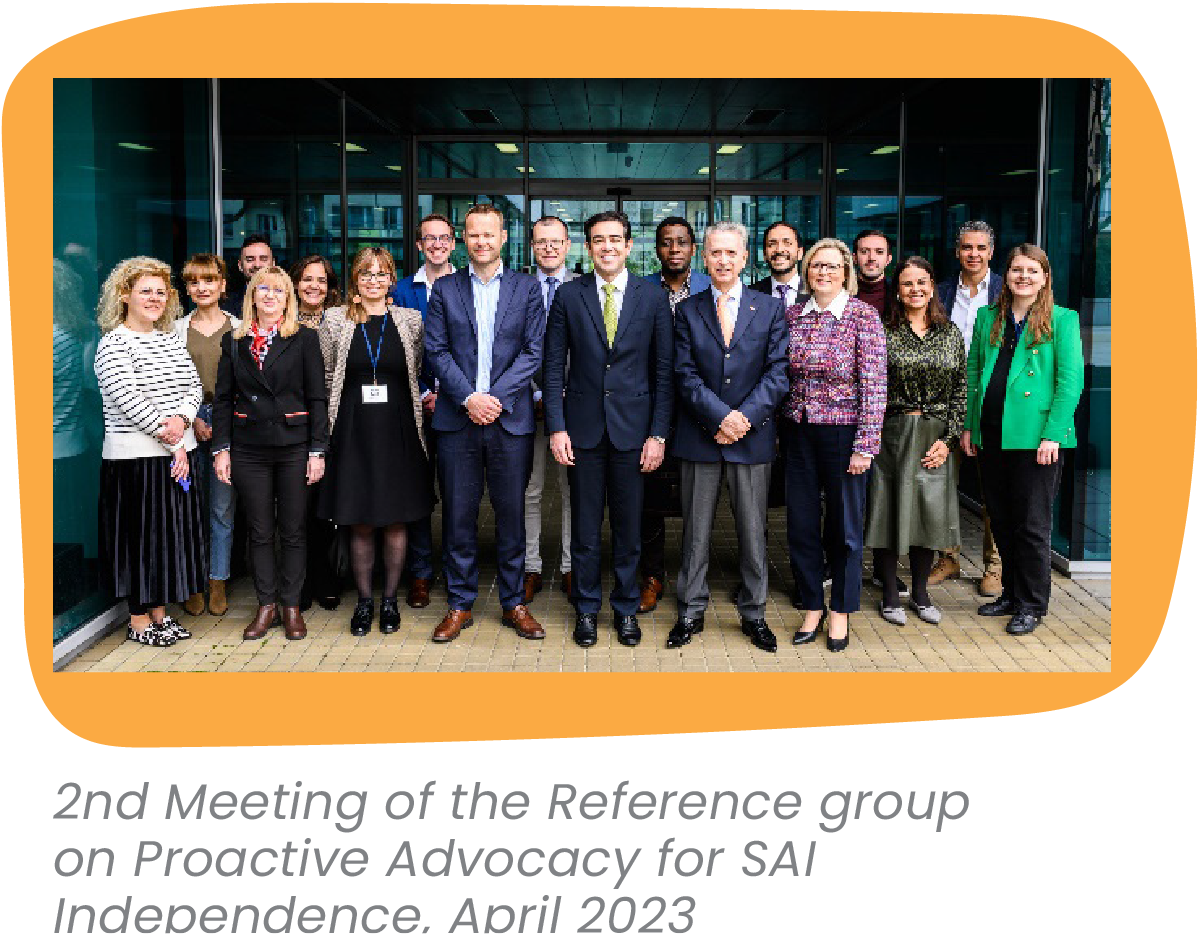
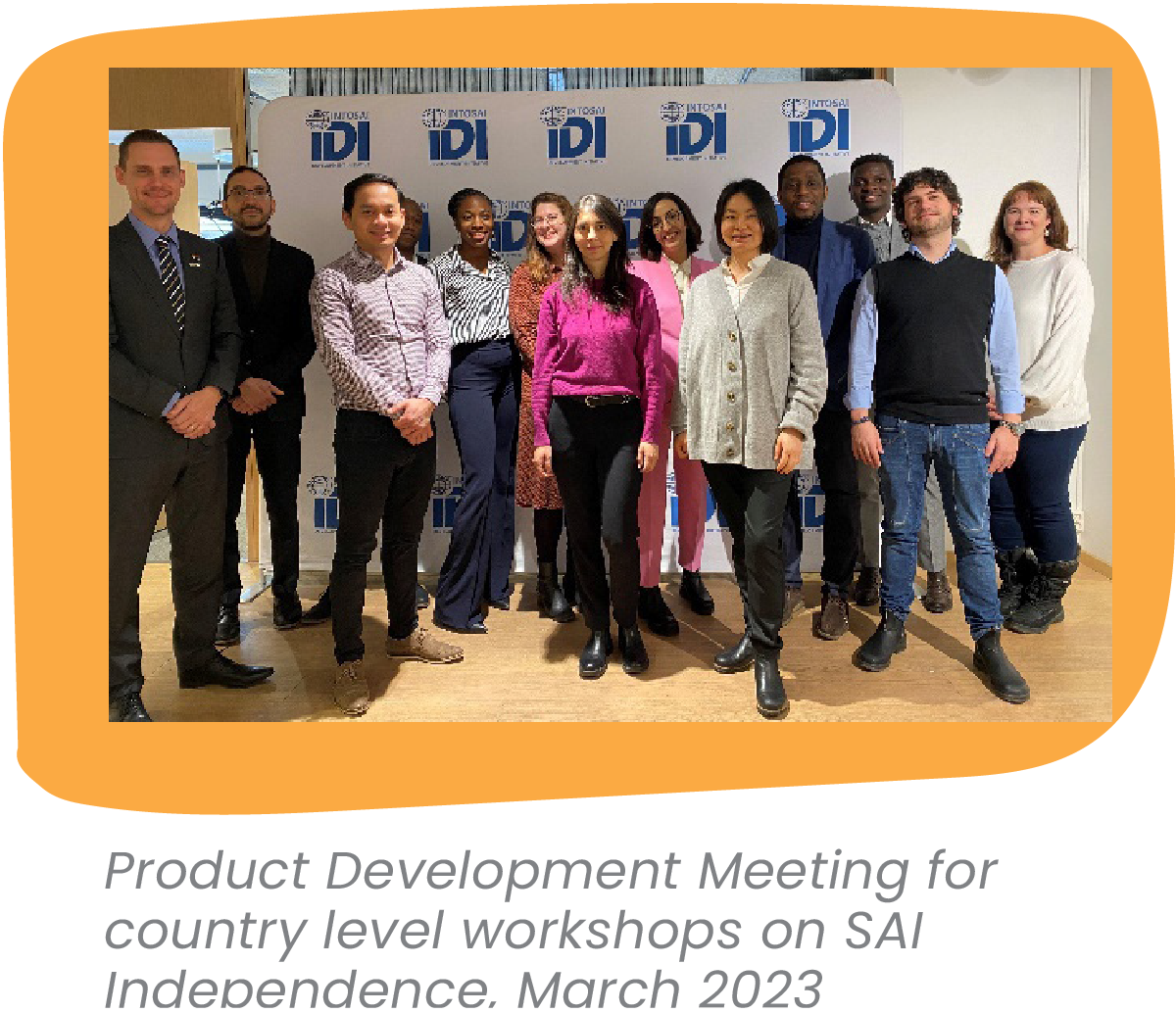
Finally, we will stimulate country level interaction between SAIs and their accountability ecosystem i.e., Parliament, Civil Society Organisations, Integrity Institutions, and support the roll-out of the country level workshops between SAIs and accountability actors which where piloted in the Solomon Islands in 2022 and Malawi in 2023.
This initiative will be offered on-demand and tailored to different topics to demonstrate the value of SAIs.
Under Well Governed SAIs work stream, we would like to highlight two key activities for 2024:
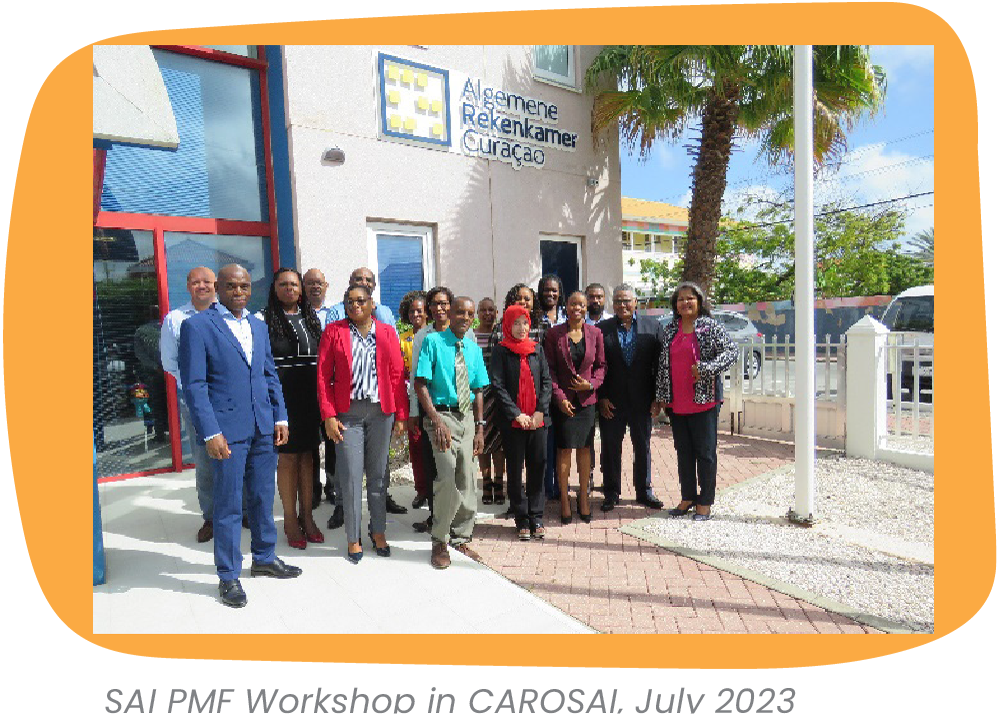
Revision of the SAI PMF Framework
With over 100 assessments done since its endorsement in 2016, the SAI PMF continues to grow as an internationally accepted framework for measuring the performance of SAIs. Notwithstanding the positive outlook in the uptake of SAI PMF globally, a periodic review and update of the framework to align with global trends and new developments in external public sector auditing is inevitable. Additionally, the review of the framework provides an opportunity to ensure that SAI PMF remains relevant and fit-for-purpose for all SAIs, regardless of size and model.
Considering that there has not been a comprehensive revision of the complete SAI PMF framework since its inception seven years ago, 2024 is an opportune time to take stock and conduct a broad consultation by inviting suggestions from the INTOSAI community and other stakeholders on possible additional enhancements to the current version of the framework. Consultations have already commenced in 2023 and the analysis of submissions will be a key activity in 2024. As the strategic lead on SAI PMF, the CBC will make the final decision on the revisions to be adopted.
Provision of SAI-level support on governance and independence
The objective of SAI-level support is to accelerate performance improvements in governance and independence for SAIs through targeted activities, mainly delivered in-country but limited in scope to 12 months. Offered jointly by the Well Governed SAIs and Independent SAIs work streams in IDI, and funded by the Swiss State Secretariat for Economic Affairs (SECO), such support seeks to help selected SAIs in addressing both internal and external constraints of SAI performance. A better governed SAI that demonstrates value and impact can appear more independent in the eyes of external stakeholders and can be more empowered to confidently engage with them, even if it still lacks de jure independence.
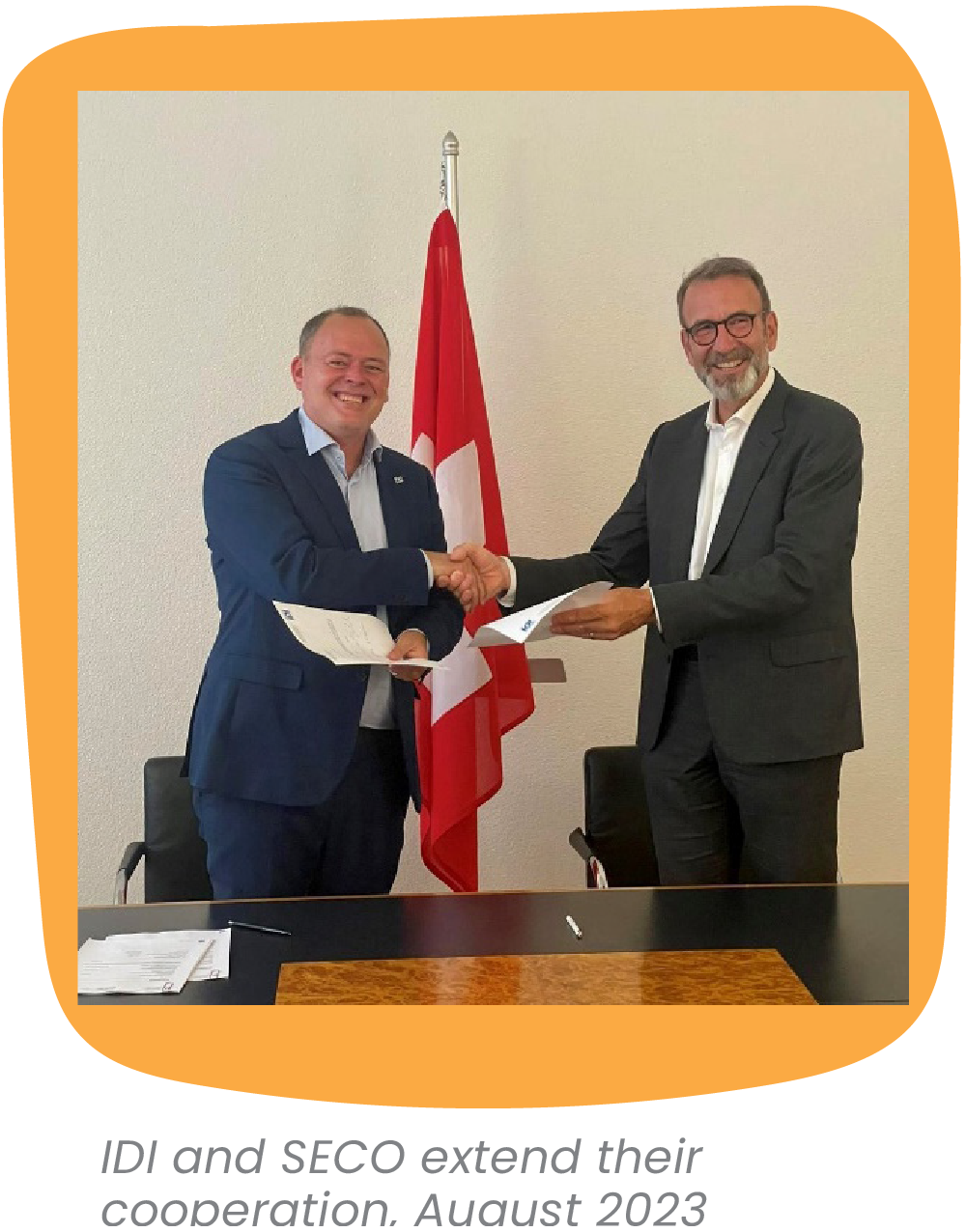
SAI-level support will cover up to six SAIs per year in the period 2024-2028, based on a set of selection criteria. The focus of each engagement may vary. For example, it may focus on working with a SAI on how to incorporate independence as a strategic plan priority and prepare it for how to manage financial and human resources when it gains more autonomy; or it may assist an SAI in strengthening its strategic dialogue with the Ministry of Finance, and support it in improving its own financial management and budget presentation to make a case for more resources in the absence of independence. In some cases, local-level CSOs will be able to access limited additional funding to strengthen their cooperation with the SAI. We are working towards making donor funding available to CSOs for supporting the independence of SAIs.
The following are the plans for Professionals SAIs work stream:
We have restructured the work stream around four value deliverables – Competent SAI auditors, Effective SAI Audit Leaders, Sustainable Audit Practices, and Raised SAI Audit Profile.
We would like to highlight three new developments planned to start in 2024.
1. The Centre for SAI Audit Professionals (The Centre) will start its functions in 2024. It will offer services to SAIs across the world in a blended format. Besides building an extensive and accessible online platform, the Centre will also organise in-person interactions for SAI auditors. It will offer five streams of support.
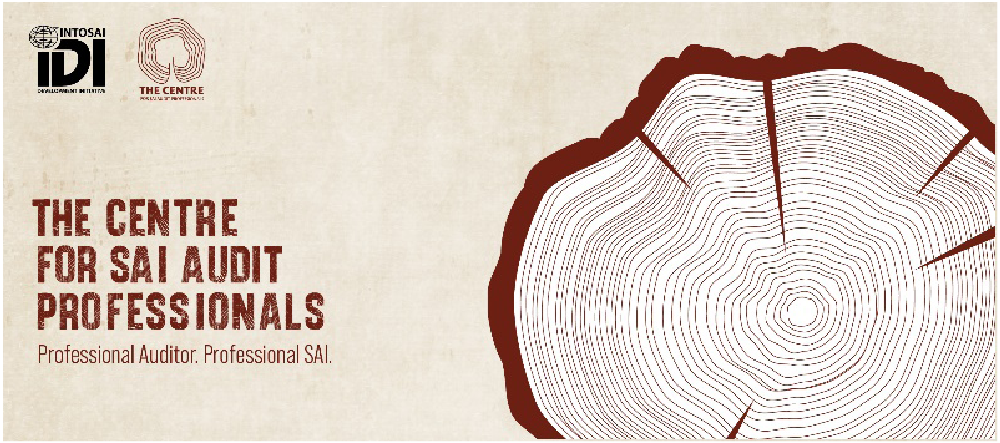
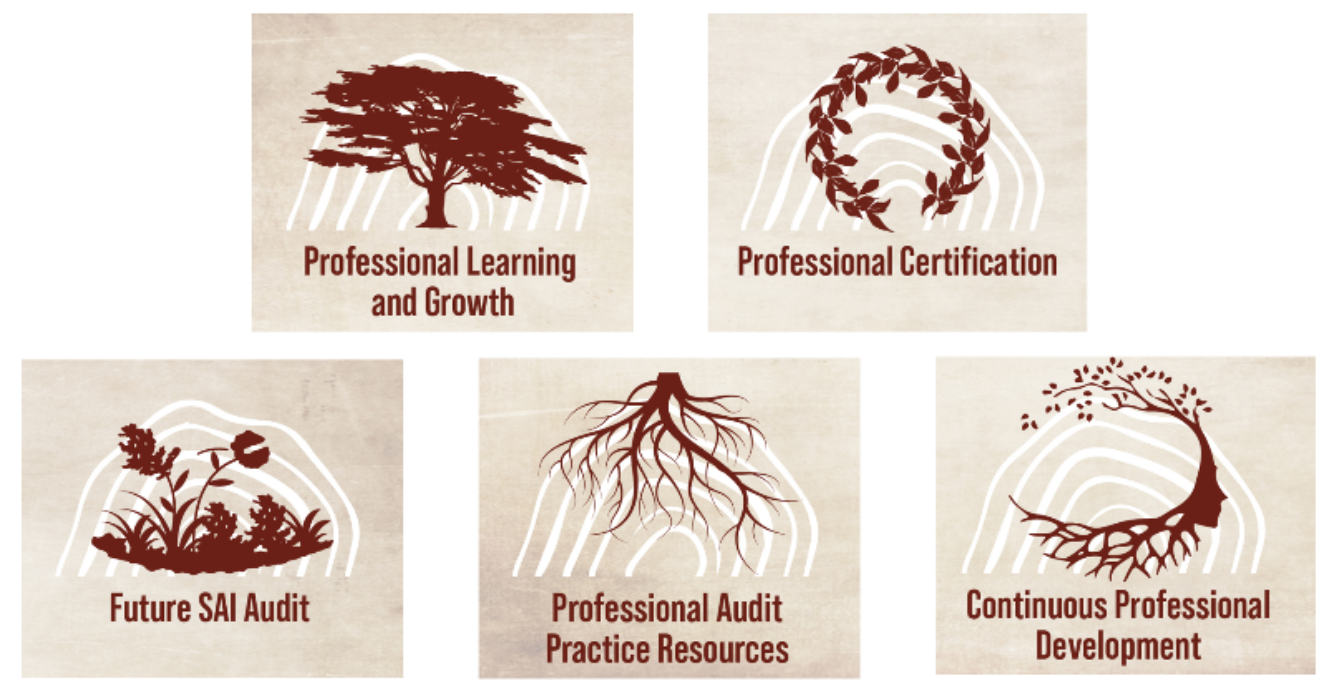
Under Future SAI Audit, we will bring together audit professionals from SAIs and stakeholders to explore, experiment and innovate solutions for the future SAI audits and auditors. Professional Audit Practice Resources will offer a library of up-to-date tools and guidance on core audit practice. The Professional Certification stream will offer professional education qualification for SAI auditors through PESA in the three audit streams, certification for learning specialists, and a certificate for quality management specialists. Professional Learning and Growth stream will create opportunities for focused learning on a variety of specific areas within the three audit streams, without any certification requirements. Under Continuous Professional Development we will foster alumni networks of certified pools.
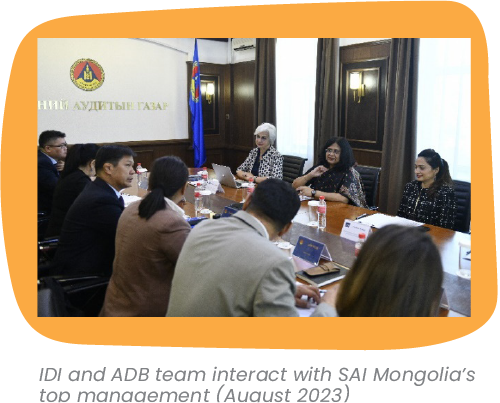
2. We also plan to start piloting ‘Shared Services Arrangements’ for supporting SAIs in implementing systems of audit quality management. Many of the SAIs in the INTOSAI community face challenges in having in place a critical mass of qualified quality management persons. Building a pool of such resources at the INTOSAI and regional level can facilitate support to SAIs in calling on such resources to support their quality management implementation. We plan to work together with partners to develop a certificate for quality management specialists and foster a network that can provide shared services across the INTOSAI community.
3. In 2024 we will also start providing holistic and in-depth support to SAIs for enhancing Sustainable Audit Practices. The nature and scope of such support will be determined based on comprehensive needs assessment conducted by the SAI team with support from IDI. Based on this we could offer support in areas such as strategic and annual audit planning, development and maintenance of audit methodology, growing competent SAI auditors, building robust follow up systems, setting up systems of audit quality management and most importantly raising SAI audit profile. We plan to offer such support in financial, performance and compliance audits. This area of work will be scaled up based on demand and availability of resources.
Relevant SAIs work stream has the following plans:
We have restructured the work stream around four value deliverables - Competent SAI auditors, Effective SAI Audit Leaders, Sustainable Audit Practices, and Raised SAI Audit Profile. The new developments under this work stream involve designing long-term, predictable support for trends which we will work with throughout our strategic plan period. These are auditing technology, SDGs, and climate action.
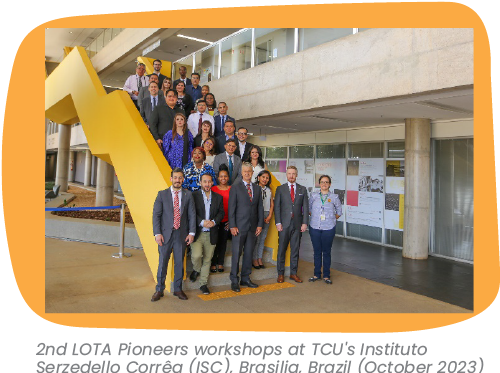
Longer term predictable support for technology auditors – We recognise the transformation that technology can bring in the SAI audit world and the need for SAI auditors to be equipped to provide relevant audit response to the digital transformation in the public sector. As such we plan to restructure LOTA Pioneers into two streams of regular support for technology auditors. While one stream will offer professional education and audit support for conducting technology audits, the other stream will build competencies of auditors in using data analytics in audit. We visualise technology audit professionals who are able to audit government digital transformation processes, build trust in government technology systems, establish a better regulatory framework for technology, and promote transparency, accountability, inclusion, and compliance in technology use. We plan to develop detailed competency frameworks, curriculum, professional education and on the job support in the two streams.
A pool of SDG Auditors – We have been supporting SAIs in auditing SDGs since 2016. Such support has mainly included guidance and facilitation of cooperative audits on preparedness and implementation. To make our support more sustainable, we plan to work together with key partners to identify competencies required by SDG auditors and build professional and practical education for developing those competencies. We believe that developing such a pool and offering such support on a regular basis will lead to high quality and high impact SDG audits on areas of national significance. Developing strategic audit plans for SDG audits will also be a part of the curriculum. We plan to support SDG auditors in mainstreaming audit perspectives on policy coherence, multi stakeholder engagement and leave no one behind, both in their strategic audit plans as well as SDG audits conducted.
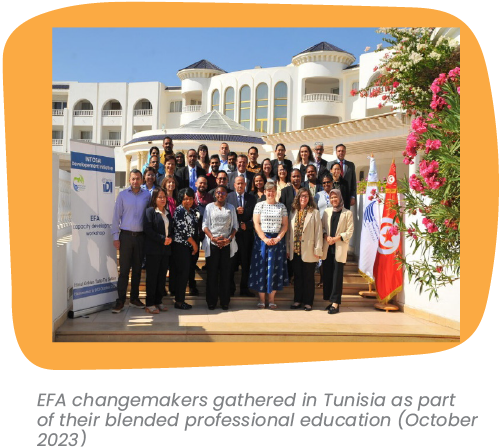
Explore long-term support for auditing climate action –
We are currently supporting 45 SAIs in English and Spanish in auditing climate change adaptation actions. In 2024 we will continue this support and start support for Arabic-speaking SAIs. Given the tremendous significance of the topic of climate change and recognising the need to explore other areas including sustainability information on environment, climate finance and energy, we will discuss longer-term cooperation with WGEA and other partners like Association of Chartered Certified Accountants (ACCA) and IFAC as International Federation of Accountants (IFAC) for supporting SAIs in auditing these areas.
Changes for the Bilateral Support work stream for 2024:
We will finalise the revised bilateral policy. This will revisit the roles IDI plays in challenging contexts, and types of deliverables that we offer. Country projects linked to the GSAI programme will all be in the implementation phase, and new support will be provided to development of a range of capacities in the eight SAIs (Benin, Belize, Dominica, Haiti, Honduras, Kyrgyzstan, Lebanon and Tajikistan). We will also provide supplementary support to jurisdictional control to SAI Guinea.
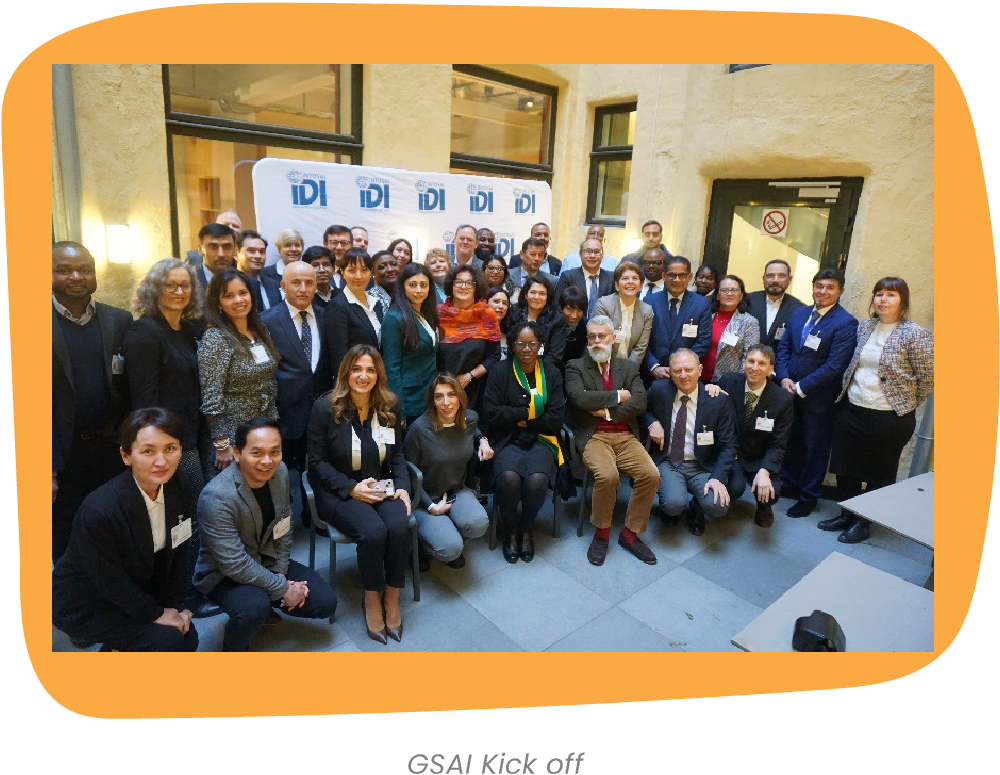
The Global Foundations work stream will focus on the following during 2024:
Working with stakeholders will be one of our priorities. We will conduct joint webinars with the Inter-Parliamentary Union (IPU) on SAI-Parliament collaboration, as well as working on institutional arrangement products with IPU. Along with the INTOSAI Journal, we will host four joint webinars on stakeholder engagement and communications, while expanding our focus on strategic communications and outreach through external media and stakeholder engagement, a new IDI website and even more intensive use of digital channels. We will also conduct an advocacy campaign related to the role of SAIs vis-à-vis Climate Change.
In terms of brokerage, we will roll out BUSS in the ARABOSAI region and seek funding for the GSAI countries during their first phase of support implementation. Webinars on advantages, lessons learnt, and bottlenecks of peer-to-peer arrangements will be offered to all INTOSAI members, in collaboration with CBC P2P workstream. Significantly, 2024 will also be important for us for dissemination of the 2023 Global SAI Stocktaking Report, which will be completed in late 2023.
Gender and Inclusion
We will steadily continue our gender and inclusion journey - as an organisation, with the SAIs and with our partners. This includes applying an intersectionality lens and working towards better integrating different aspects of diversity in the planning, implementation, monitoring and reporting of our initiatives. Here are some of the highlights for 2024:
Embedding gender and inclusion in audits
IDI is streamlining gender equality and inclusion across its audit initiatives. Through embedded educational modules and initiative requirements, we prompt SAI participants to rethink audit scopes and gain a new point of view on how diverse topics might impact different social groups. For instance, in our work on technology audits in LOTA Pioneers, IDI stresses that technologies that are meant to make the lives of citizens better can also create a digital divide and lead to digital exclusion or even digital poverty. As an example, computers can make our decisions faster, but not necessarily fairer. When performing audits, it is important to take this into consideration and strive for ‘techquity’ - the intersectionality between the use of technology and ensuring equitable environments. Race, gender, ethnicity, socioeconomic status, and disability all impact on how citizens reach and use public services. Strategically-implemented technology has the power to address and mitigate the barriers citizens face.
The same is relevant for IDI-supported global audits of climate change adaptation actions (CCAA) where inclusion is one of the three cross-cutting themes. In the four main themes of the CCAA audit, i.e., disaster risk reduction, water resources management, sea level rise and coastal erosion, and implementation of adaptation planning or plans, we cover inclusion aspects in education and through audit questions banks made available to SAI auditors.
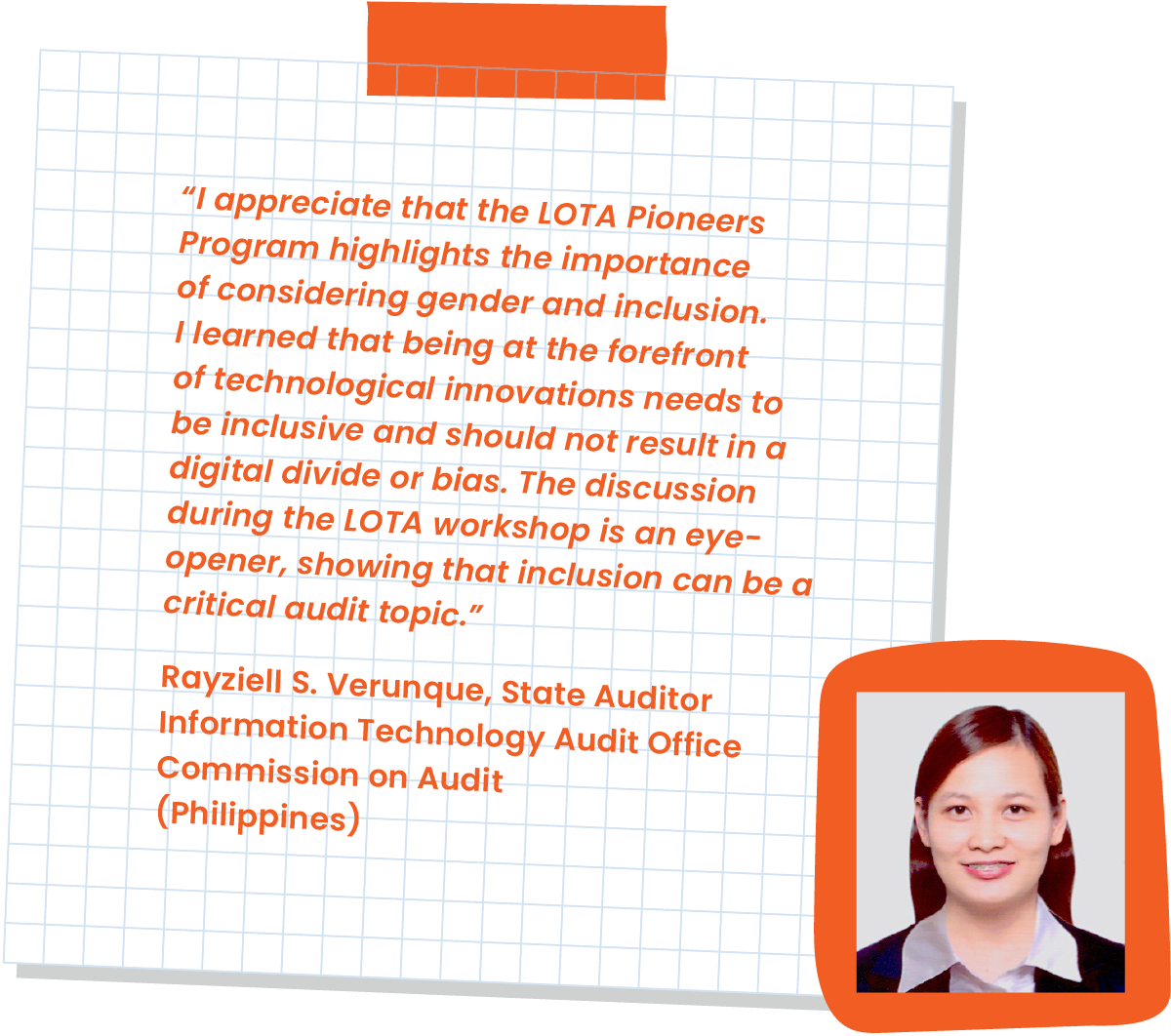
Gender and inclusion as part of human resources and leadership
As part of SAI internal governance processes and routines, human resource management (HRM) provides avenues to lead by example on gender and inclusion and to directly impact SAI staff.
From 2024, the TOGETHER Initiative will provide support to SAIs to enhance their internal capacity to be gender and inclusion responsive in different dimensions of their HRM processes and systems such as recruitment, staff well-being, professional development, HR strategy and policy, etc. SAIs themselves will identify their issues and priorities by reviewing their own practices. TOGETHER has a dedicated component on Gender, Diversity and Inclusion. This component is expected to expand over the next period, with the adaptation of existing resources to SAIs’ needs, and the development of a dedicated network of SAI Gender, Diversity and Inclusion champions. They will contribute as resource persons and support their own SAIs.
Gender and Inclusion is often about people and organisational culture. Through the Mastery Initiative, IDI offers dedicated spaces for the exchange of perspectives and experiences between SAI leaders. This is crucial, as they are responsible for setting the tone at the top on organisational culture, including gender and inclusion. The leadership masterclass on inclusive leadership, which started in 2023, will also be offered in 2024.
For more information on gender, intersectionality and inclusion in IDI’s support to SAIs and as an organisation, see the more detailed plans for the different work streams and for corporate affairs.
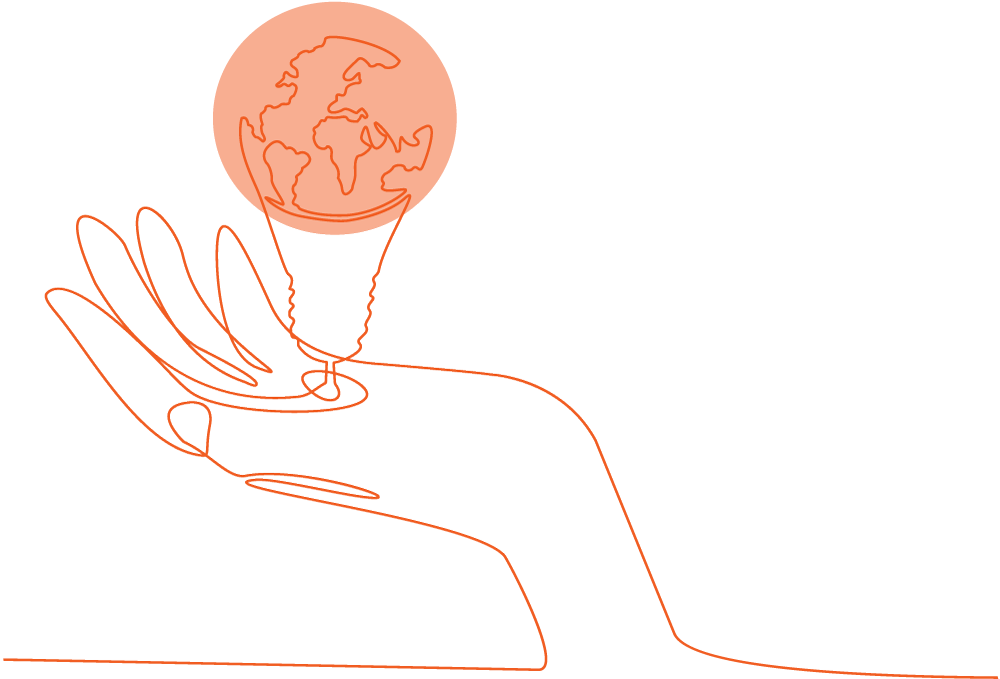
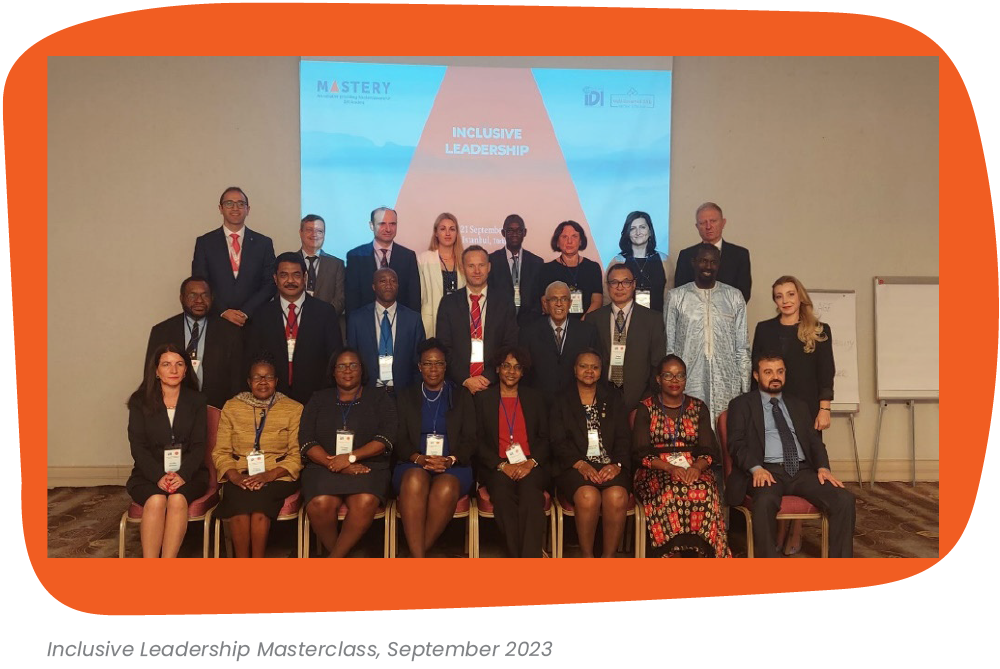
Financial Position
The financial situation of IDI remains sound. Total income for 2024 is estimated at NOK 139.0 million with expenditures of NOK 131.1 million.
The income amount includes balances of NOK 10.2 million from 2023 assumed to be carried forward in full. Total carry forward at the end of 2024 including funds received in advance for future activities amount to NOK 28,0 million. In general, pressure on government finances is likely to affect future visibility of funding from donors. Plans for 2024 include a limited increase of staff due to scaled-up support at the SAI-level, delivering on new platforms and strengthened communications support. The increase in the 2024 budget compared to the 2023 revised budget includes the assumption of continued travel activity without pandemic related restrictions. IDI will monitor the expenses carefully, balance them against available funding and take necessary action to reduce the scope of activities if needed.
Overall, the strong support seen from donors over the last years, despite several significant global challenges, gives us comfort in our ability to deliver on the ambitions of IDI’s new strategic plan.
IDI Expenditure 2022-2023 (in Million NOK)
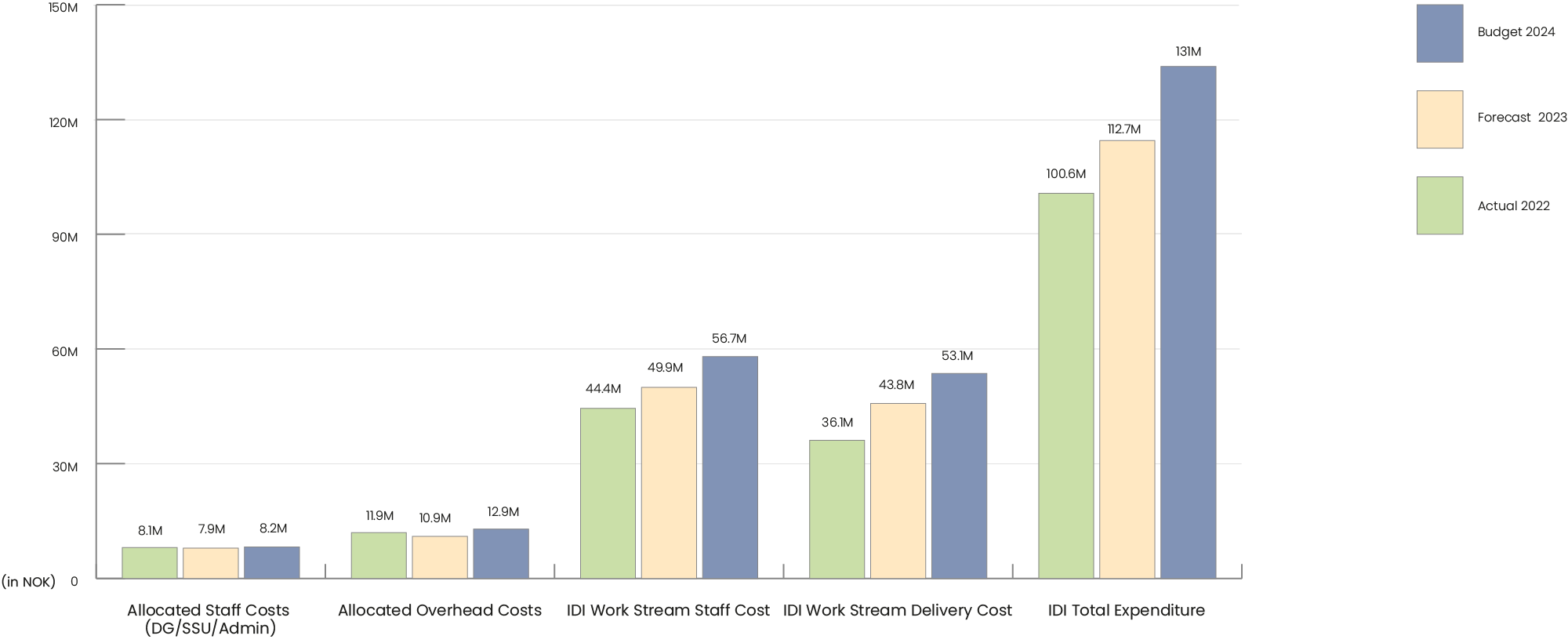
Work Stream Operational Plans
Appreciation for our partners
IDI wishes to thank all our partner organisations for their financial, in-kind, and strategic support
Core Funding Partners

Earmarked Funding Partners

International SAI Community
- The International SAI Community shares a common vision and set of strategic goals and organizational priorities as set down in the INTOSAI Strategic Plan 2023-2028. IDI partners with INTOSAI bodies to support delivery of the INTOSAI plan, as well as the IDI Strategic Plan. his includes the INTOSAI Governing Board, General Secretariat, Policy, Finance and Administration Committee, Capacity Building Committee, Knowledge Sharing Committee and its constituent working groups like WGEA, Working Group on IT Audit (WGITA) and Working Group on Impact of Science and Technology on Audit (WGISTA) and Professional Standards Committee (including its Financial Audit and Accounting, Performance Audit and Compliance Audit sub-committees).
- IDI also works in close cooperation with all the regional SAI organisations: AFROSAI, ARABOSAI, ASOSAI, CAROSAI, EUROSAI, OLACEFS and PASAI, and the subregions AFROSAI-E, CREFIAF and ASEANSAI. The regions provide a crucial link between IDI’s global perspective, and the specific strengths, challenges and needs of their member SAIs. The regional and sub-regional bodies are key partners for the delivery of all IDI initiatives.
Other Strategic Partners
- IDI’s Global Foundations work stream continues to support and help coordinate the work of the INTOSAI-Donor Cooperation.
- IDI and the IMF are working together, and supporting each other’s initiatives, on strengthening the audit of the use of COVID-19 emergency funding.
- IDI is partnering with IPU to facilitate stronger collaboration between SAIs and their parliaments.
- IDI has MOUs with the SAIs of Indonesia and Brazil to work together in different areas.
- IDI has signed an MOU with UN Women to promote and support gender equality and inclusion.
- IDI has a strategic partnership with the Financial Audit and Accounting Subcommittee (FAAS) of INTOSAI Professional Standards Committee.